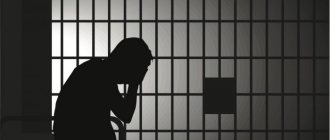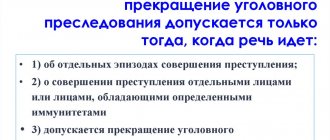1. The court, as well as the investigator with the consent of the head of the investigative body or the interrogating officer with the consent of the prosecutor, have the right to terminate criminal prosecution against a person suspected or accused of committing a crime of minor or medium gravity, in cases provided for in part one of Article 75 of the Criminal Code of the Russian Federation. 2. Termination of criminal prosecution of a person in a criminal case for a crime of a different category when the person actively repents of the crime committed is carried out by the court, as well as by the investigator with the consent of the head of the investigative body or by the investigator with the consent of the prosecutor only in cases specifically provided for by the relevant articles of the Special Part of the Criminal Code of the Russian Federation .
3. Before the termination of criminal prosecution, the person must be explained the grounds for its termination in accordance with parts one and two of this article and the right to object to the termination of criminal prosecution.
4. Termination of criminal prosecution on the grounds specified in part one of this article is not allowed if the person against whom the criminal prosecution is terminated objects to this. In this case, criminal proceedings continue as usual.
Commentary on Article 28 of the Code of Criminal Procedure of the Russian Federation
1. The article establishes the possibility of terminating criminal prosecution in cases where the suspect or accused has actively repented of the crime he committed.
2. Part 1 of the commented article stipulates that termination of criminal prosecution on this basis is possible in cases where a person has committed a crime of minor or medium gravity.
3. The court, as well as the investigator, with the consent of the head of the investigative body, or the inquiry officer, with the consent of the prosecutor, terminate criminal prosecution on this basis within the limits of their powers.
4. In part 1 of Art. 75 of the Criminal Code of the Russian Federation lists cases when there is active repentance of the suspect or accused: if after committing a crime the person confessed, contributed to the detection of the crime, compensated for the damage caused or otherwise made amends for the harm resulting from the crime, and as a result ceased to be socially dangerous.
The mere statement of a person that he has repented of committing a crime does not cause the termination of the criminal case. The suspect (accused) must commit active actions that would be aimed at resolving the criminal legal relationship that has arisen.
Thus, only the above actions of the suspect (accused) can serve as a basis for the conclusion of a criminal justice official about the active repentance of this person. At the same time, the legislator does not put forward as a mandatory requirement that in the framework of a specific criminal case the suspect (accused) commit all the actions specified in Part 1 of Art. 75 of the Criminal Code of the Russian Federation. The sufficiency of such actions, together with data on the identity of the suspect (accused), is assessed by officials who decide to terminate criminal prosecution.
5. According to Part 2 of the commented article, termination of criminal prosecution in connection with active repentance is possible when a person is suspected or accused of committing a crime of another category (i.e. grave or especially grave), but only in cases expressly established by the articles of the Special Part of the Criminal Code RF. These cases are established in the notes to the relevant articles of the Criminal Code of the Russian Federation: 126 “Kidnapping”, 127.1 “Human Trafficking”, 206 “Hostage Taking”, 276 “Espionage”, etc. This possibility is due to the fact that a person, as a rule, himself reports the crime he has committed, assists in solving it, and also takes other active actions indicating his active repentance.
6. Parts 3 and 4 of the commented article contain the rules that the termination of criminal prosecution is possible only with the consent of the suspect (accused) and that if this person objects to the termination of the criminal proceedings, the proceedings continue as usual. These provisions essentially coincide with the rule contained in Part 2 of Art. 27 Code of Criminal Procedure of the Russian Federation.
Article 28. Termination of criminal prosecution in connection with active repentance
- home
- Laws and regulations
- Criminal Procedure Code of the Russian Federation
- Article 28. Termination of criminal prosecution in connection with active repentance
1. The court, as well as an investigator with the consent of the head of the investigative body or an inquiry officer with the consent of the prosecutor, have the right to terminate criminal prosecution against a person suspected or accused of committing a crime of minor or medium gravity, in cases provided for in part one of Article 75 of the Criminal Code of the Russian Federation.
2. Termination of criminal prosecution of a person in a criminal case for a crime of a different category when the person actively repents of the crime committed is carried out by the court, as well as by the investigator with the consent of the head of the investigative body or by the investigator with the consent of the prosecutor only in cases specifically provided for by the relevant articles of the Special Part of the Criminal Code of the Russian Federation .
3. Before the termination of criminal prosecution, the person must be explained the grounds for its termination in accordance with parts one and two of this article and the right to object to the termination of criminal prosecution.
4. Termination of criminal prosecution on the grounds specified in part one of this article is not allowed if the person against whom the criminal prosecution is terminated objects to this. In this case, criminal proceedings continue as usual.
Commentary on Article 28
1. The regulation in the commented article of the special basis and, to a certain extent, the procedure for terminating criminal prosecution in connection with active repentance is due to the establishment in Art. 75 of the Criminal Code of the relevant criminal law prerequisites. In conjunction with the provisions of Art. 212 - 214, 221, 239, 254, 384, etc. the commented article creates procedural conditions and the procedure for terminating criminal prosecution and criminal proceedings on the specified grounds at different stages of legal proceedings.
2. The two parts of the commented article (part 1 and part 2) differ significantly: in the style of presentation of normative material; according to the method of formulating normative rules (in part 1 - direct, in part 2 - referential); according to the level of certainty of regulations. Part 1 establishes that if the grounds specified therein exist and the listed conditions are met, authorized subjects of criminal proceedings “have the right” to terminate criminal prosecution. Part 2 states that the termination of criminal prosecution if a person actively repents of committing a crime is carried out by the court, the prosecutor, as well as the investigator and inquiry officer with the consent of the prosecutor only in cases specifically provided for by the relevant articles of the Special Part of the Criminal Code.
3. The article under comment is entitled “Termination of criminal prosecution in connection with active repentance.” Article 75 of the Criminal Code, on which Art. 28 of the Criminal Procedure Code, called “Exemption from criminal liability in connection with active repentance.” In both cases, the title of the article focuses on “active repentance.”
4. Active repentance is not only repentance, regret about what has been done, suffering about what happened. The suffering and experience of the person who committed the crime can be taken into account when the court imposes punishment for the crime, but this is not enough to free the person from criminal liability and, therefore, terminate criminal prosecution on the basis of the commented article. Repentance, according to the legislator, should be active, active, expressed in real actions of a positive nature. First of all, it must be outwardly manifested in a full and sincere admission of guilt in the crime. Further, the active repentance of the person who committed the crime is objectified in the fact that after committing the crime, this person voluntarily confessed, contributed to the detection of the crime, compensated for the damage caused or otherwise made amends for the harm caused as a result of the crime.
5. Repeated adjustments to Art. 28 Code of Criminal Procedure and Art. 75 of the Criminal Code made it possible, finally, to remove the discrepancy between them and the provisions of the articles of the Special Part of the Criminal Code, which prescribe exemption from criminal liability for persons who have committed some serious and especially serious crimes.
Requirement of Part 1 of Art. 75 of the Criminal Code regarding the possibility of terminating criminal prosecution in connection with active repentance only in relation to persons who have committed a crime of minor or moderate gravity, means that by the time the case is terminated it must be established that a crime of this particular severity has been committed. It seems preferable to indicate the qualification of the crime of which the person is actually accused, not in the decision to terminate the criminal prosecution, but before its adoption - in the decision to bring the person as an accused (see commentary to Article 25).
6. In accordance with Part 1 of the commented article and Part 1 of Art. 75 of the Criminal Code, only a person who has committed a crime for the first time can be exempted from criminal liability on the grounds specified therein. First-time offenders are considered not only to be persons who have not actually committed a crime before, have not been under investigation and have not been convicted by a court, but also those who have been convicted but are considered unconvicted, since their criminal record has been expunged or withdrawn.
7. The Criminal Code (Part 1, Article 75) names voluntary confession among the forms of manifestation of active repentance. In this regard, in the process of proving the case, it is necessary to take into account, firstly, that surrender must be voluntary, and not forced, i.e. be the result of a person’s sincere repentance, and not the result of persuasion or other forms of influence of interrogators or investigators, and not the result of an unfavorable situation for him, due to the availability of certain information about the actions of the person who came with repentance from the said officials (although the positive influence of relatives, friends and other people close to him does not question the “quality” of turnout). Secondly, surrender must, as a rule, take place on the part of the participant in the crime, although due to illness, injury and other circumstances, the application for surrender may be sent by mail or through other persons. Thirdly, the statement (oral or written) to surrender must express a truthful and unconditional admission of guilt in the crime. It cannot be “guilty” if there is no sincere repentance and admission of guilt by the person who appears.
8. The Plenum of the Supreme Court of the Russian Federation explained to the judges that in each case “... it is necessary to check whether the statement submitted to the investigative authorities, or the message (in any form) about the crime made to an official of the investigative authority, was voluntary and whether this is related to the fact that the person was detained as a suspect and confirmed his participation in the commission of a crime” (clause 4 of the Resolution of the Plenum of the Armed Forces of the Russian Federation dated June 11, 1999 N 40).
9. The second (after confession) form of manifestation of active repentance of the Criminal Code indicated the person’s assistance in solving the crime. In general terms, it means the provision of assistance to law enforcement agencies by their actions on their own initiative to the accused (suspects) in exposing the perpetrators of a crime, detecting instruments and traces of a stolen crime, and identifying other evidence.
10. Another indicator of the presence of active repentance is the compensation by the person who committed the crime for the damage caused and otherwise making amends for the harm caused by the crime. Compensation for material damage can be carried out by transferring things, money or other valuables to the victim. Compensation for moral damage is carried out mainly in monetary terms by agreement of the parties. Compensation for damage may take the form of restoring the damaged property to its previous state (repair of a car, cottage, etc.). In addition, the person who committed the crime can ask for forgiveness, an apology from the victim, publish a corresponding message in the press, or use the capabilities of local radio for this purpose.
11. Specific manifestations of repentance are included in the subject of proof in a criminal case. The active actions of a person must be proven, confirmed by evidence collected according to the rules of the Code of Criminal Procedure, and reflected in protocols and other case materials. The decision to terminate criminal prosecution must indicate what exactly the active repentance of the person who committed the crime consists of, and what evidence confirms this.
Decisions to terminate criminal prosecution on the grounds specified in the commented article are canceled, as practice shows, mainly due to the lack of proof of the facts of active repentance, and therefore the unfoundedness of the decision made.
12. A person who has committed a serious or especially serious crime is released from criminal liability (with the termination of criminal prosecution) if the conditions provided for in Part 1 of Art. 75 of the Criminal Code, and the grounds specified in the relevant articles of the Special Part of the Criminal Code.
13. Termination of criminal prosecution on the basis of the commented article is possible at different stages of the criminal process and at different stages of some of them (Articles 28, 212 - 214, 239, 254, 384, 408 of the Code of Criminal Procedure). In this case, the courts of the first, second and supervisory instances (if it is a judicial panel) terminate the criminal prosecution or criminal case by ruling; the judge during a single examination and the presidium of the court (in the supervisory instance), and at the pre-trial stages also the prosecutor or, with his consent, the investigator, the inquirer - by resolution.
14. Among practitioners, there is an opinion that consent to terminate criminal prosecution can be given not only by prosecutors, but also by their assistants. Such a decision is not based on the provisions of the commented article and Parts 2, 6 of Art. 37 Code of Criminal Procedure.
15. The fact that the person who committed the crime has no objections to the termination of criminal prosecution on the grounds in question must be reflected in the decision to terminate the criminal prosecution (see commentary to Article 212).
16. The victim has the right to appeal the decision to terminate criminal prosecution on a general basis.
17. In practice, the question arose about the possibility of familiarizing the victim with the materials of a case terminated at the stage of preliminary investigation. Such a right of the victim is not specified in the provisions of the Code of Criminal Procedure governing the procedure for terminating a case at this stage (Article 212). However, according to Art. 42 of the Code of Criminal Procedure, the victim has the right to familiarize himself with all the materials of the case from the moment the preliminary investigation is completed, and its completion by termination of the case is one of the forms of ending the preliminary investigation established by law. Familiarization with the materials of a discontinued case is a means of ensuring that an interested person has the right to appeal the decision of the investigative body to the court or to a higher prosecutor. Therefore, a positive solution to the issue under consideration corresponds not only to the norms of the Code of Criminal Procedure, but also to Art. 46 of the Constitution.
18. For the actions of the prosecutor in connection with the termination of a criminal case or criminal prosecution on the basis under consideration, see the commentary. to Art. 25.




